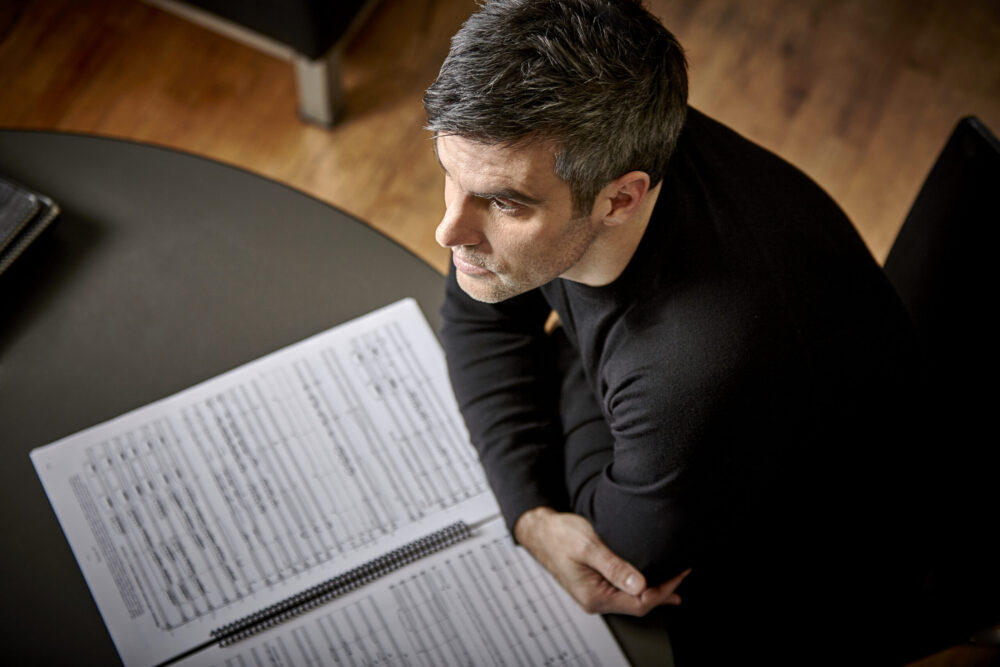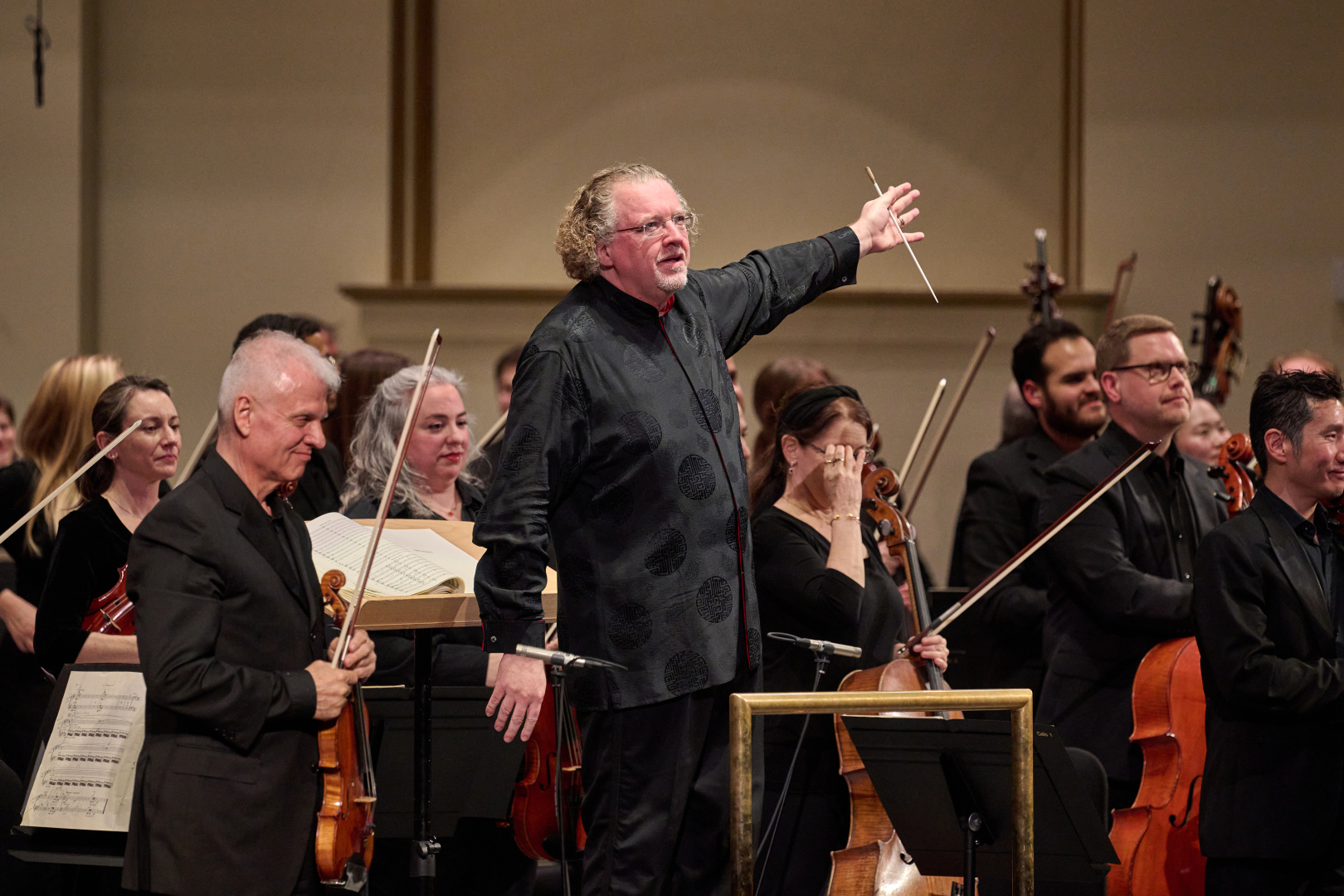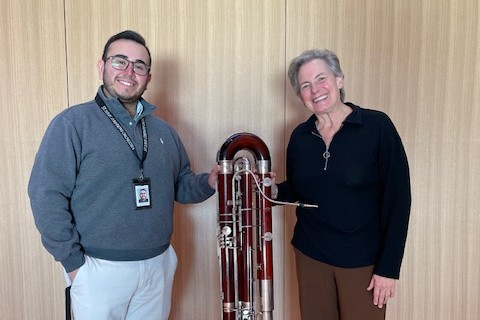25/26 SLSO Composer in Residence Kevin Puts on New Commission House of Tomorrow
By Iain Shaw
The program for the opening weekend of the St. Louis Symphony Orchestra’s 2025/26 season features the World Premiere of House of Tomorrow by Pulitzer Prize-winning composer and 25/26 SLSO Composer in Residence Kevin Puts. World-renowned mezzo-soprano Joyce DiDonato will join the SLSO on stage from September 26 to 28 to perform the song cycle by the St. Louis-born composer.
Along with James Lee III’s Fanfare for Universal Hope, House of Tomorrow is one of two works the SLSO has commissioned to celebrate the orchestra’s return to the renovated and expanded Powell Hall at the Jack C. Taylor Music Center. But as this month’s release of a new album featuring SLSO Music Director Stéphane Denève conducting the orchestra’s World Premiere performances of three other Puts works reminds us, House of Tomorrow is just the latest milestone in a relationship that has already created works like Silent Night Elegy (2018), Virelai (after Guillaume de Machaut) (2019), and Concerto for Orchestra (2023).
Ahead of Opening Weekend, Puts shared some insights on the inspiration behind House of Tomorrow, his friendship with Denève, and what this commission means to him.

Tell us about your starting point for House of Tomorrow. Were there any particular inspirations or reference points that you had in mind?
I searched long and hard for a text on which to base this important commission. With the help of Marie-Hélène Bernard and others at the SLSO, we read poems by local poets, both living and deceased, but it wasn’t until I found the phrase “a house of tomorrow” while skimming through Kahlil Gibran’s The Prophet that I truly felt I could move forward. In fact, I may have found this phrase by putting the word “house” into the search engine of the Poetry Foundation’s website!
I was thinking primarily of celebrating the new Powell Hall and all its exciting renovations—truly a “house of tomorrow”—with this work, but upon reading more of Gibran’s text I found I could go deeper than that.
What qualities or themes contained in Gibran’s writing spoke to you?
First of all, I found the structure of The Prophet lent itself well to the forces for which I was writing: mezzo-soprano soloist, chorus and orchestra. In this series of 26 fables, a gathering of citizens asks a local prophet to reflect on a number of aspects of the human condition.
I could imagine these entreaties—“Speak to us of joy and sorrow,” “Speak to us of pain,”—sung by the chorus, to whom the soloist (acting as the prophet) would respond. The chorus could then repeat the words and fragments of the prophet’s responses in counterpoint with the soloist, as if reflecting on their wisdom. The phrase “a house of tomorrow”, occurs in at least two of these short fables. In short, the exquisite poetry of the text inspired the sense of wonder and optimism that I needed to write the music I wanted to write.
Is House of Tomorrow a departure in any way from your previous work?
Stéphane Denève and I have wonderful talks about the music we love, and the opening movement of Bach’s St. John Passion has come up more than once. In fact this oratorio, as well as the great composer’s St. Matthew Passion, are among my favorite works in all the history of music.
I leaned into this quite overtly in House of Tomorrow, especially in the work’s opening movement with its quietly undulating strings and sustained woodwind lines floating above. In this way, the piece is somewhat of a departure for me, though I have never been hesitant to call to mind music of the past in my own work (for example, Inspiring Beethoven or Flute Concerto, both of which contain quotations of music from the Classical Period).
In 2023, you told us that when creating a new piece, you like to take time to consider how you can “add value to the repertoire.” How do you think House of Tomorrow achieves this?
Did I say that? Well, with each project I aspire to write something of use to people when I am gone, though it’s anyone’s guess if anything will last! I think it is important as a composer to always strive for this, even if you fall spectacularly short.
As a young composer working my way through music school, I got the sense living composers felt, to some extent, that music of great heart, direct emotion and real soul was a thing of the past. You could comment on this older music with some sense of irony and detachment, but to address these qualities directly in one’s own music was pastiche and laughable. I simply don’t buy it! When I write music, it comes from a place of sincere emotion, of big feelings, and I look forward to sharing it with the audience through the amazing performers I am so privileged to work with.
How would you “guide” a listener through House of Tomorrow?
In the piece, the prophet reflects on joy, sorrow, pain, youth, longing, the acceptance of grief…all subjects very much at home in the concert hall, aspects of the human condition that composers have addressed in their music for decades. While I hope the music will allow the audience to reflect on these aspects, I think I am most excited simply to share with our audience the musical journey of the piece, one which I hope flows organically from beginning to end in a rather cyclical way.
And I am so deeply privileged to know and work with the great mezzo-soprano Joyce DiDonato, who starred as Virginia Woolf in my opera The Hours at the Metropolitan Opera. House of Tomorrow is the third major work I have written especially for her, and I hope I have given her a vehicle for her extraordinary talents as a performer and interpreter.
What does it mean to you to have House of Tomorrow commissioned for the opening weekend marking the SLSO’s return to Powell Hall?
As a native of St. Louis, the gift of this important commission is deeply meaningful to me. I grew up hearing my grandmother talking about Powell Hall and the St Louis Symphony Orchestra and Leonard Slatkin, and I never dreamed as an eight-year-old doing my first improvising on the piano that I would be writing music for this storied orchestra, or that I would become familiar with the orchestra itself by way of several other commissions and performances leading up to this one over the years. I am grateful to the whole SLSO family for believing in my work and entrusting me with creating new music for this milestone in the orchestra’s history.
Iain Shaw is the SLSO’s Content Manager.


